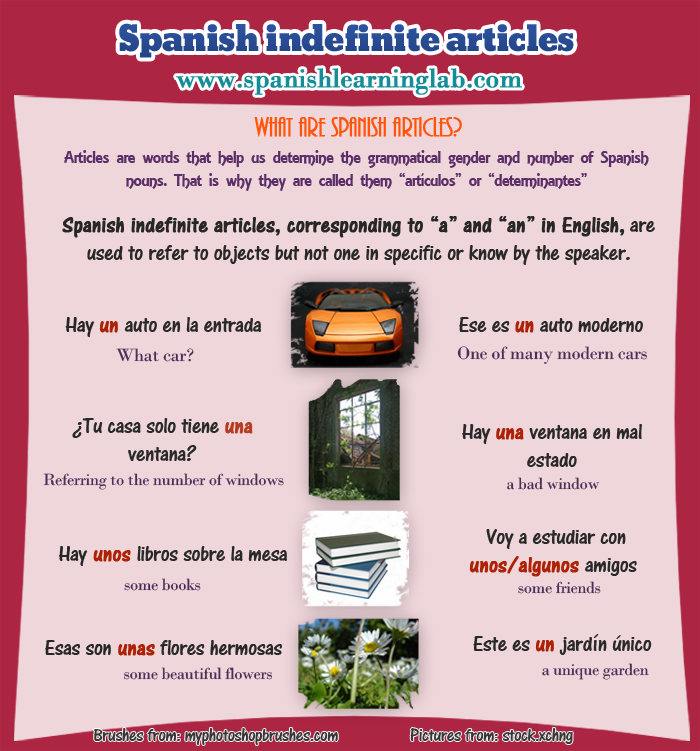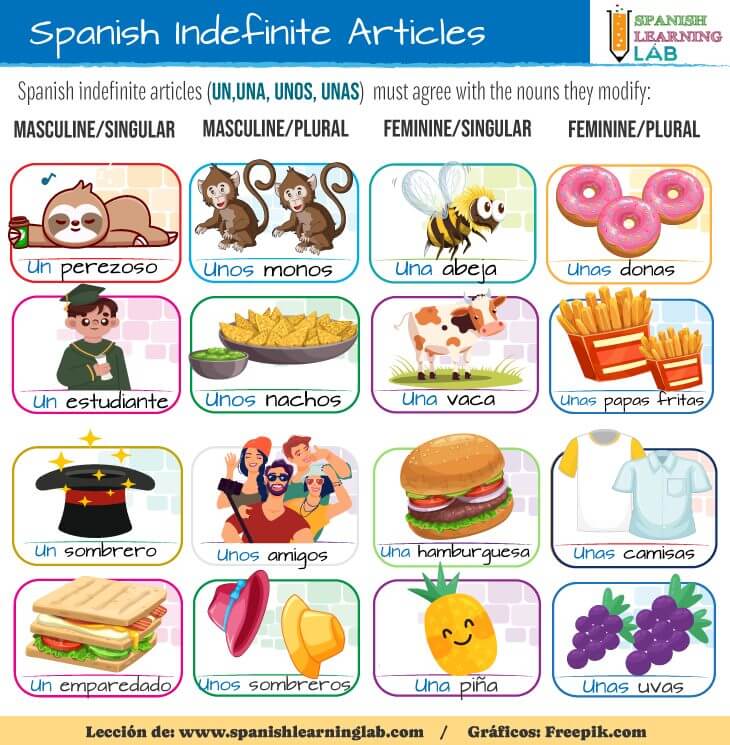Both definite and indefinite articles in Spanish are very useful to talk about different topics in the language. Using articles correctly does make a big difference in a real conversation. Spanish indefinite articles are called LOS ARTICULOS INDEFINIDOS, and they are the equivalent to AN, A and SOME in English. This lesson will show you several examples of sentences using indefinite articles, plus exercises to practice this topic. Let’s start…

How to make sentences using indefinite articles in Spanish
LOS ARTÍCULOS INDEFINIDOS or indefinite articles in Spanish are used to designate a non-unique object from a group. To put it differently, the definite article “EL” in “El pez azul” (the blue fish) tells that we are talking about a specific “blue fish”, perhaps the only blue one in a group of fish. On the other hand, if we said “Un pez azul” using one of the indefinite articles in Spanish, then it could be any “blue fish” from any place or group, not one in specific. As you can imagine, these articles are related to the number (singular/plural) and gender (masculine/feminine) of nouns.
- Hay un perro en el patio. (Indefinite art. – Possibly a dog from the street or owned by anyone)
- El perro está en el patio. (Definite art. – It is very likely that it refers to our dog)
Let’s discuss another example. In the sentence “La cocina está sucia” (The kitchen is dirty), where LA COCINA refers to an object previously known by both speakers. However, if we said “Una cocina está sucia”, then we would not clearly state which of all kitchens is dirty. Notice that we will use the article “UN” for masculine nouns like “PERRO”, and “UNA” for feminine nouns like “COCINA”.
Some examples using Spanish indefinite articles
Here is a cool set of pictures representing essential nouns in Spanish and showing how to use Spanish indefinite articles to refer to them. Try to analyze it, and then listen to four extra examples below.

Here are some examples of sentences using indefinite articles in Spanish. Notice how they must agree in gender and number with the nouns they modify.
|
UNA (feminine/singular) – Tengo una computadora.
Translation: I have a computer
|
|
UNAS/ALGUNAS(feminine/plural) – Hay unas pastillas sobre la mesa
Translation: There are some pills on the table
|
|
UN (singular/masculine) – ¿Puedes prestarme un lápiz?
Translation: Can you lend me a pencil?
|
|
Unos/Algunos (masculine/plural) – Estos son algunos/unos de los libros que me prestaste.
Translation: These are some of the books you lent me
|
Language Note: Sometimes, it is better to use the word ALGUNOS instead of the indefinite article UNOS, just like in the last example.
When to use the in Spanish indefinite articles UN, UNA, UNOS, UNAS
There are certain things to consider when using these articles to refer to objects in real situations. Pay attention to these three points and then practice with some exercises about Spanish indefinite articles with an interactive quiz.
First, we generally do not use indefinite articles in negative sentences, except on occasions when we need to emphasize something:
- No tengo computadora. (I don’t have a computer)
- Ella no tiene amigos. (She doesn’t have any friends)
- No tengo un solo centavo. (I don’t have a single penny)
Second, the article UNA changes to UN when used before a few feminine nouns that begin with an stressed “A” sound, that is stress on the first syllable, no matter if the word begins with H. Some nouns following this rule are: “Un arma” (a weapon), “Un hacha” (an ax), “Un águila” (an eagle). Here are a couple of sentences using these nouns:
- Hay un águila en el árbol. (There is an eagle on the tree.)
- ¿Me puedes prestar un hacha? (Can you lend me an ax?)
- El sospechoso carga un arma. (The suspect is armed.)
Finally, indefinite articles are not used in Spanish before nationalities, professions, religions and political affiliations. To illustrate this, saying “Soy ingeniero” (I am an engineer) is completely correct, but saying “Soy un ingeniero” is not, unless you add adjectives. Despite the rule, there are always situations where you might need these articles, but in others it will be better to skip them.
- Su padre es español. Nació en Madrid y él es doctor. (His father is Spanish. He was born in Madrid and he is a doctor.)
- María es cristiana. (Maria is a Christian.)
- Mario es un maestro alegre y creativo. (Mario is a creative and cheerful teacher.)
